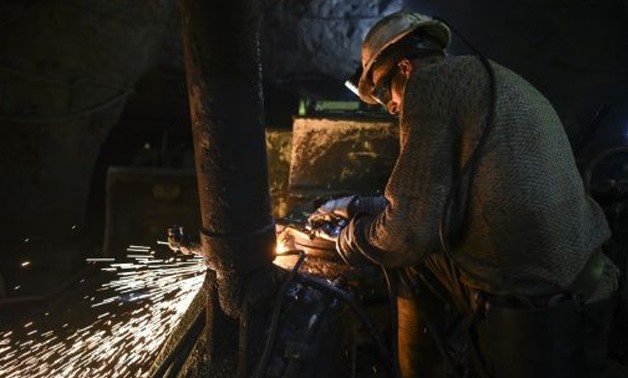
Mining - AFP
Miner Islam Kurti breaks off from hammering at stones to express indignance that Serbia disputes the ownership of his workplace, the mineral-rich Stanterg mine, a rare economic asset in Kosovo.
Nearly 20 years after the war between Serbian forces and Kosovo's ethnic Albanian pro-independence rebels, this 59-year-old is delighted that the Trepca mining complex -- of which Stanterg is a part -- was nationalised late last year.
The mine, known as Stari Trg to Serbs, "was never Serbian and never will be," Kurti insists.
The legislative elections of June 11 will not call into question this takeover: Kosovo's Albanians do not care at all about the anger of Belgrade, which considers itself the true owner of Trepca.
Mostly located in the ethnically-divided northern municipality of Mitrovica, Trepca was once one of the largest companies in Yugoslavia, at its peak employing 17,000 people, but now struggles to attract badly needed investment.
A shadow of its former self, with now roughly 4,000 jobs split between ethnic Albanians and Serbs, who work under separate but parallel management structures, the mines are still bitterly disputed by Kosovo and Serbia.
Kosovo, a former province of Serbia, is predominantly ethnic Albanian, and Mitrovica is sharply divided between an Albanian south and a Serb-dominated north.
The one thing the two sides have in common is high unemployment.
Last year, there were 2,200 applications for 100 jobs at Trepca, according to Hilmi Haxha, Albanian chief financial officer at the mines.
- Miners' struggle -
Kurti is a veteran worker at Stanterg, which became a symbol of nationalism against Serbia in the late 1980s. Belgrade has never recognised Kosovo's independence, unilaterally declared in 2008 and since backed by more than 110 countries.
In 1989, shortly before Yugoslavia began to tear apart into conflict, Serbian strongman Slobodan Milosevic suspended Kosovo's autonomy. Along with his colleagues, Kurti went on hunger strike.
"After eight days and eight nights" they were arrested, jailed for two months, and then forbidden "to even approach the entrance to the mine," he explains.
Poles, Bulgarians, Bosnians and Montenegrins were brought to replace them. Kurti returned in March 2001, after the war and two years of rehabilitation of the mine, which, according to Albanians, had been flooded by Serbs as they fled the area.
In support of its position on the mines' ownership, Belgrade points to its investments in the complex and the fact that Trepca was Yugoslav property.
Trepca "belongs to Serbia, there is no doubt about it," says Oliver Ivanovic, a Kosovo Serb politician in North Mitrovica.
"Let them prove it," retorts the director of the mine, Bexhet Vinarci.
- 'Everyone's future' -
In Stanterg, the miners are welcomed at the entrance to the shaft with the inscription "Good luck!" in Albanian while the Albanian flag flies overhead.
When no private investors stepped forward when the mining company was looking to privatise, Pristina decided to officially take control of the capital and nationalised the company, becoming the main shareholder.
Seven hundred miners work up to 800 metres (2,640 feet) below ground in the 280 kilometres (174 miles) of galleries -- one of Kosovo's few economic assets. The country remains heavily dependent on international aid and remittances from some of the around 400,000 citizens who have moved abroad.
The average salary of a miner is 700 euros ($787), double the national average.
Trepca "can ensure the future of everyone" and "solve unemployment, here and on the Serb side," says Vinarci.
Rich in zinc and lead, the mine -- exploited since antiquity -- contains some 60 minerals, including gold and silver. In 2016, 13,000 tonnes of mineral concentrates sold abroad yielded 15 million euros, according to Haxha.
But this is "insufficient for the development of Kosovo," he says, adding that, in order to process the raw materials to make them more profitable, Trepca would now need to do the job itself.
- Short on funds -
In the past, this role was partly assured at Zvecan, now in the Serb zone. Behind security guards and barbed wire, this steel complex is a rusty and drowsy monstrosity, with its workshops in tatters and a huge chimney from which no smoke comes out.
"It's been a long time since the production line stopped working," comments a guard, speaking on condition of anonymity.

Comments
Leave a Comment